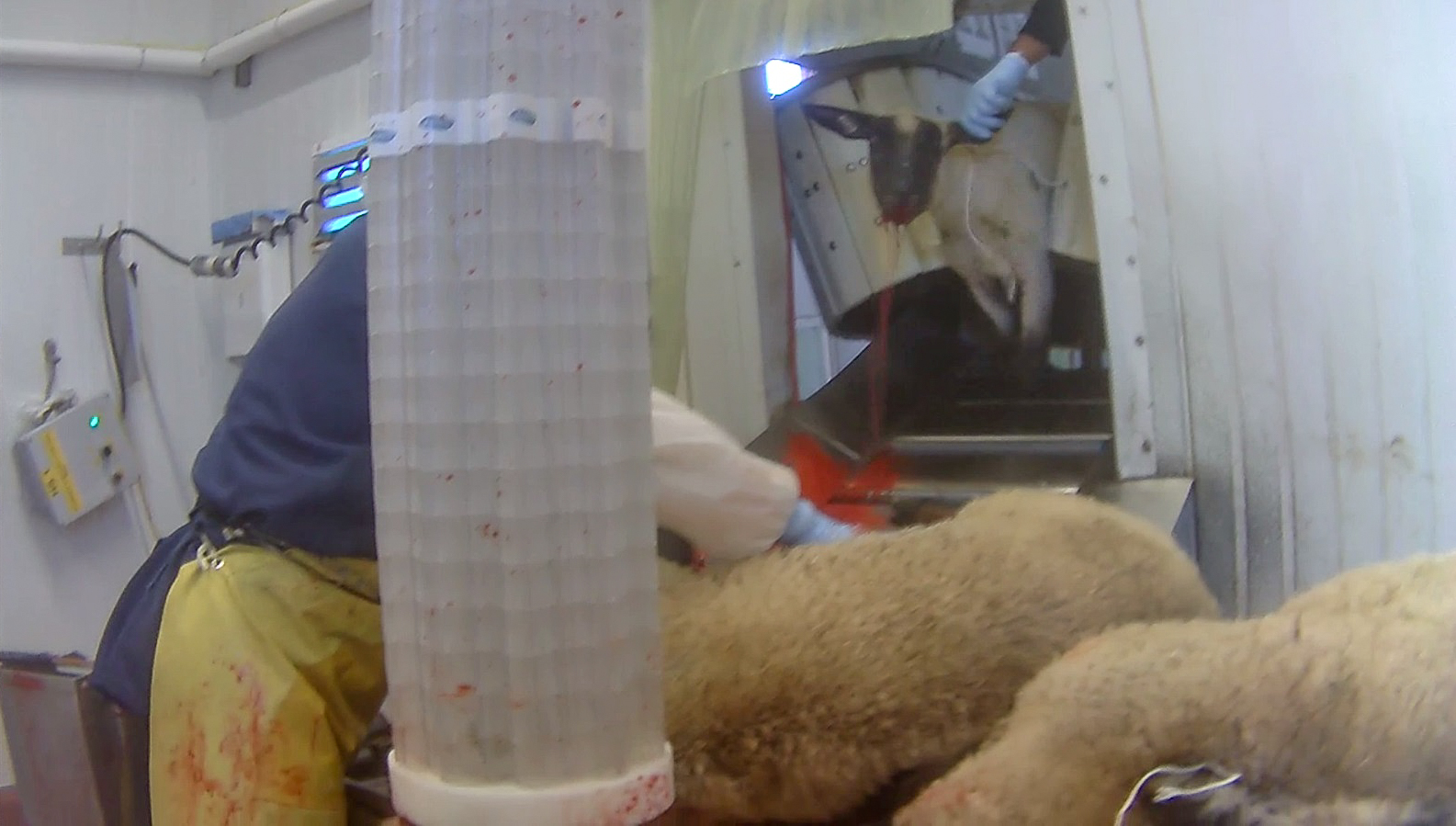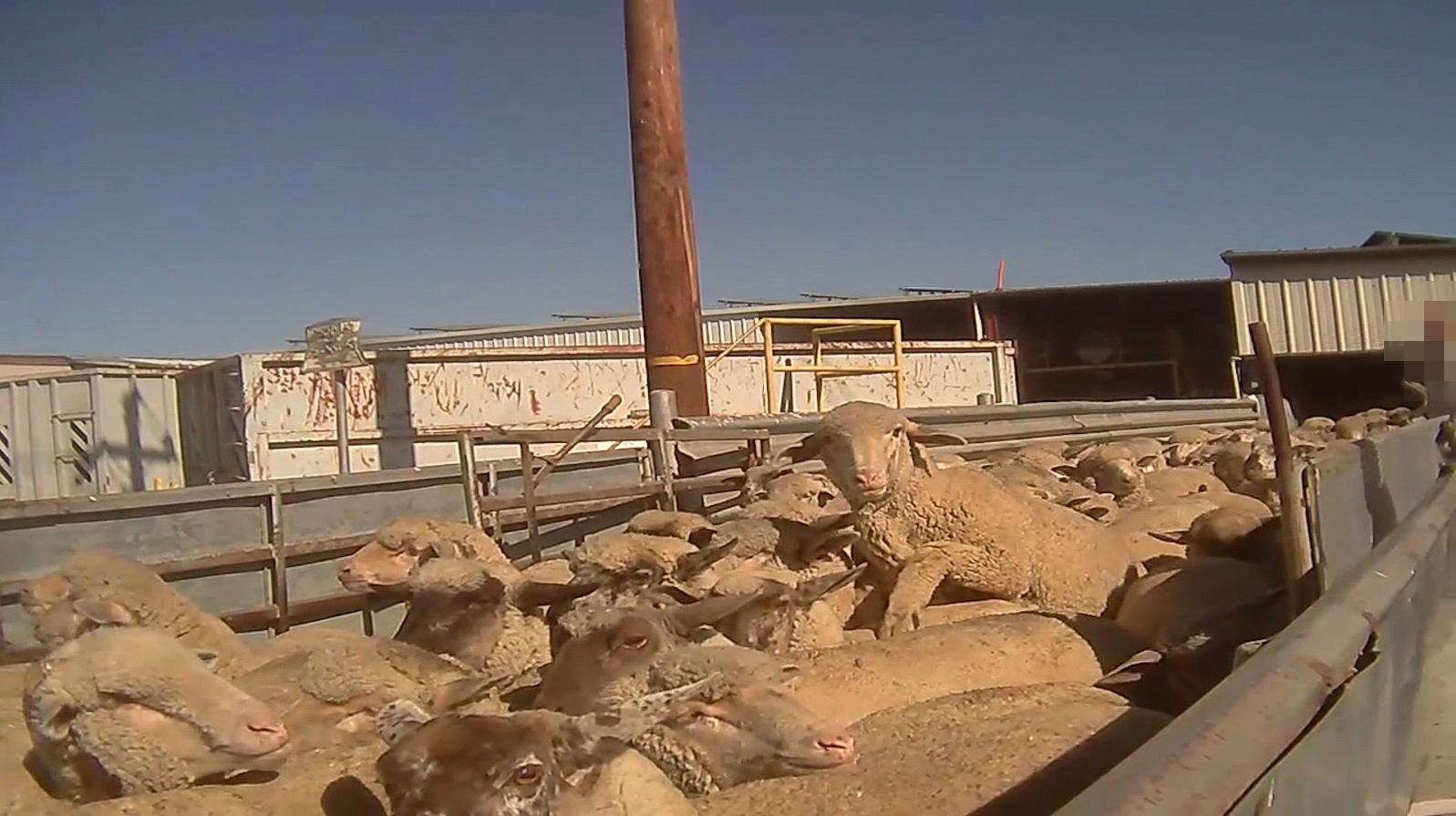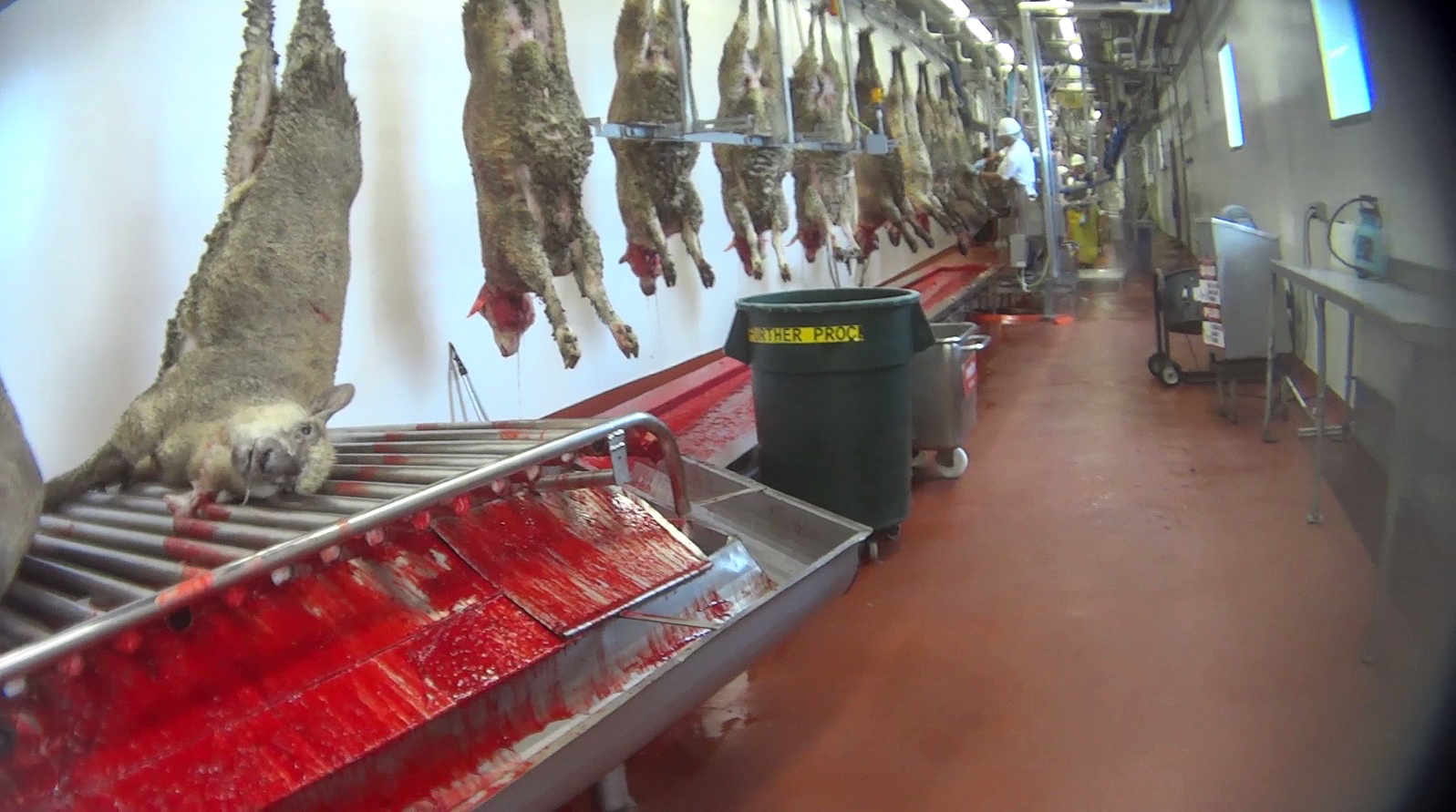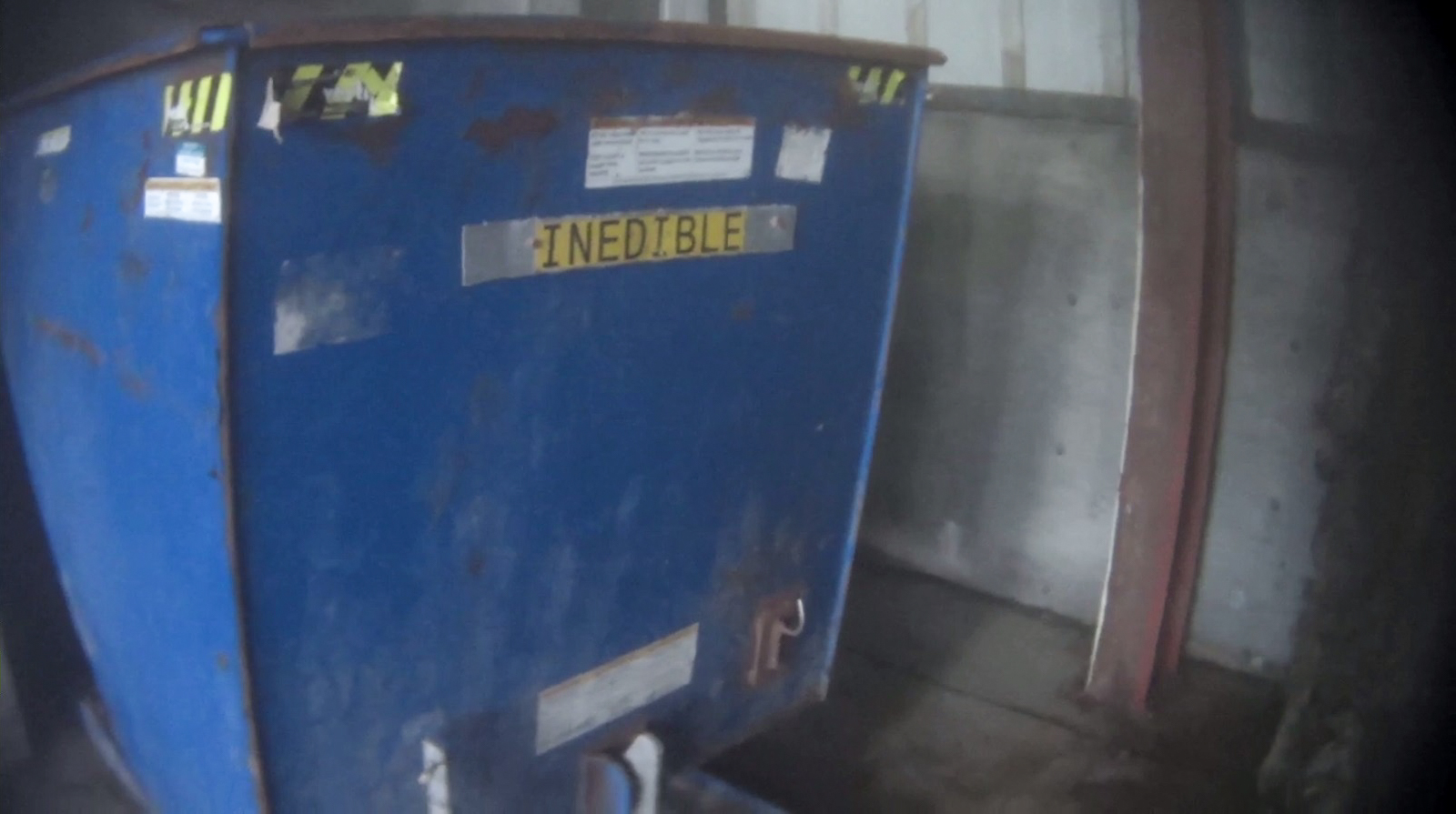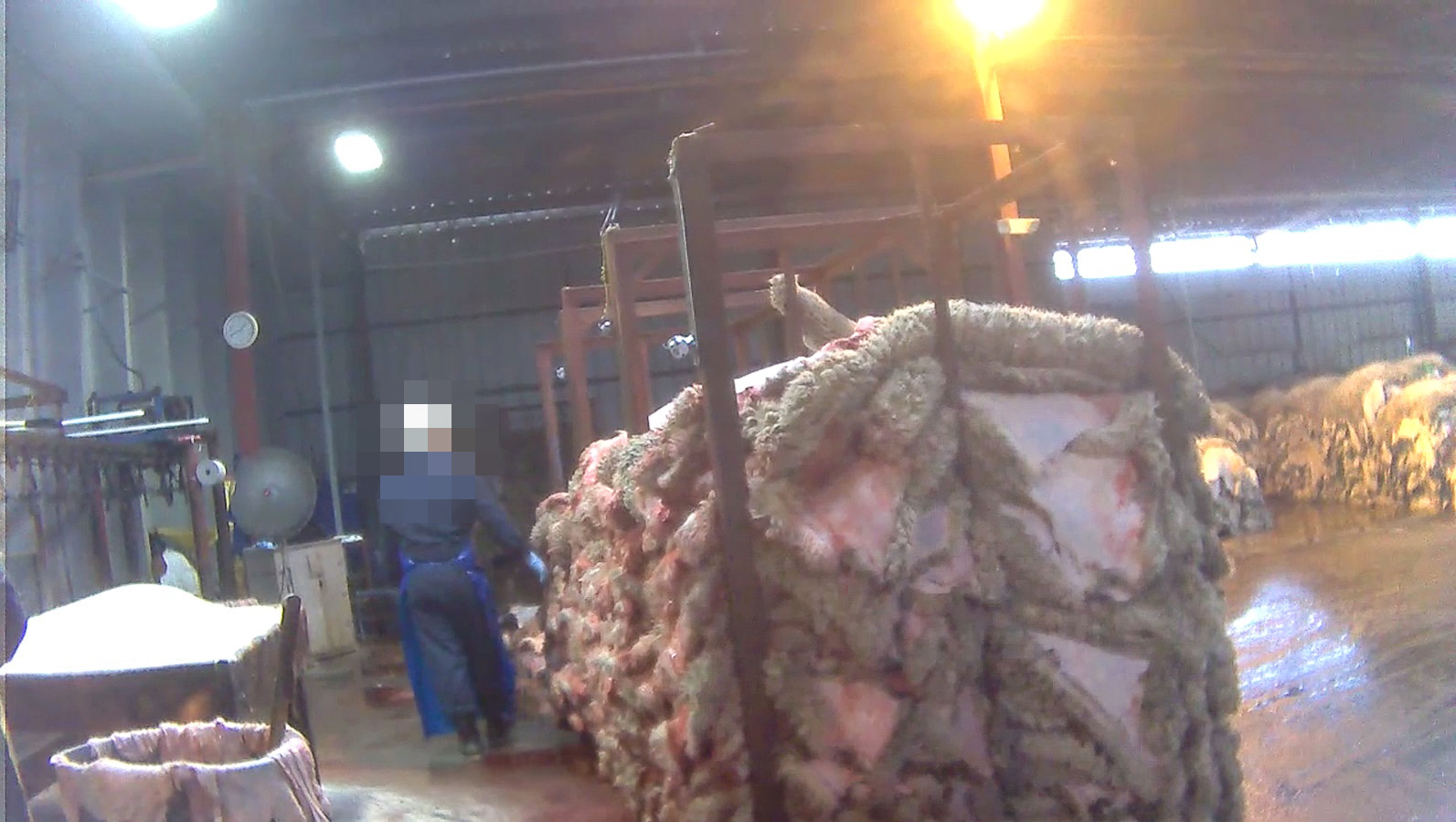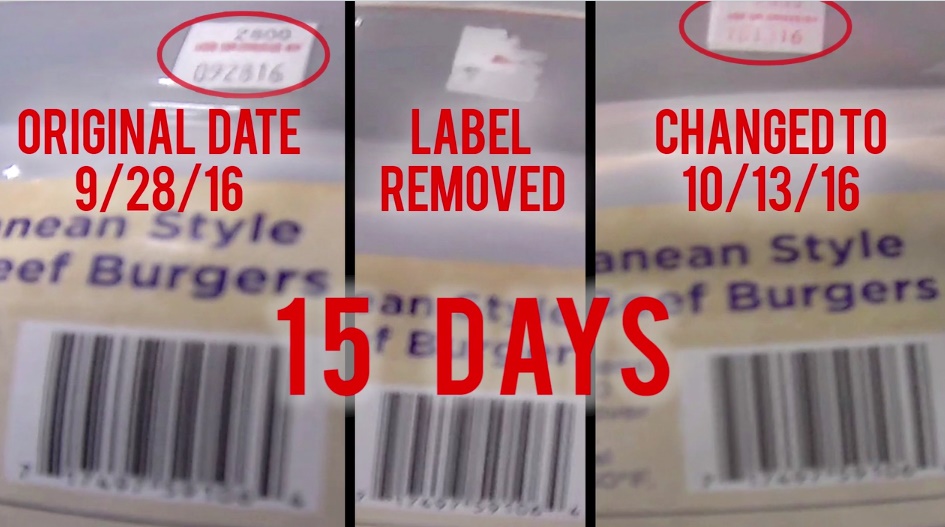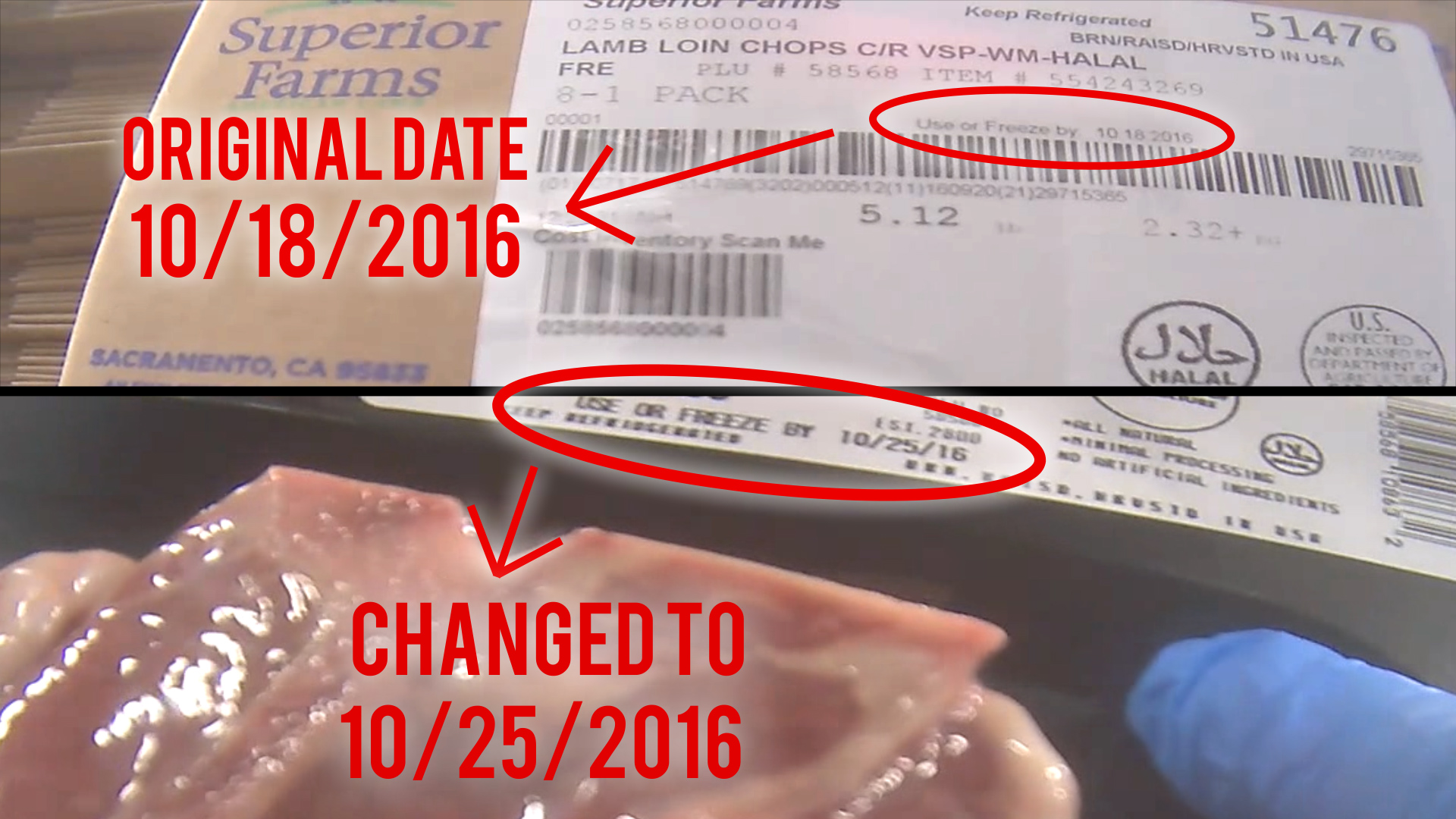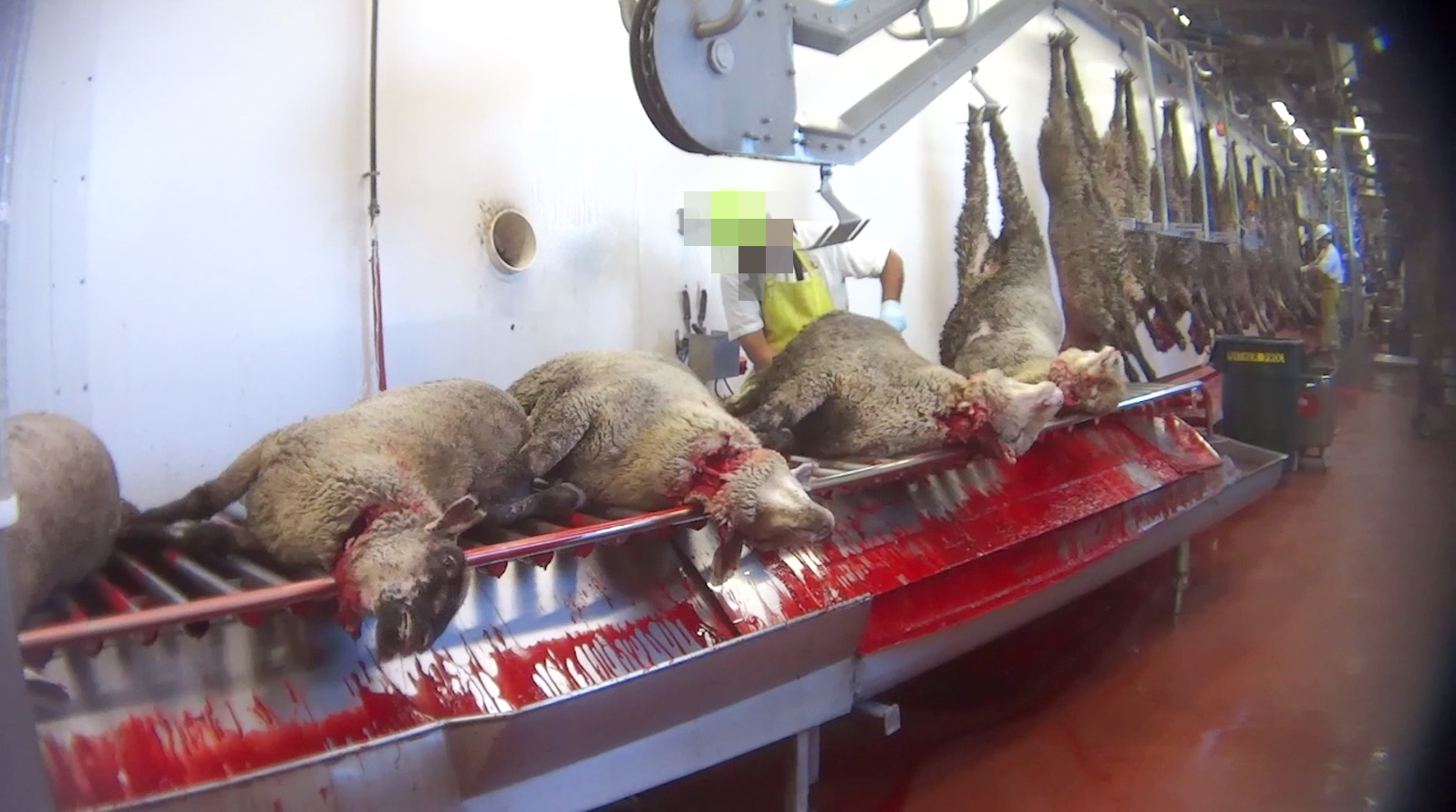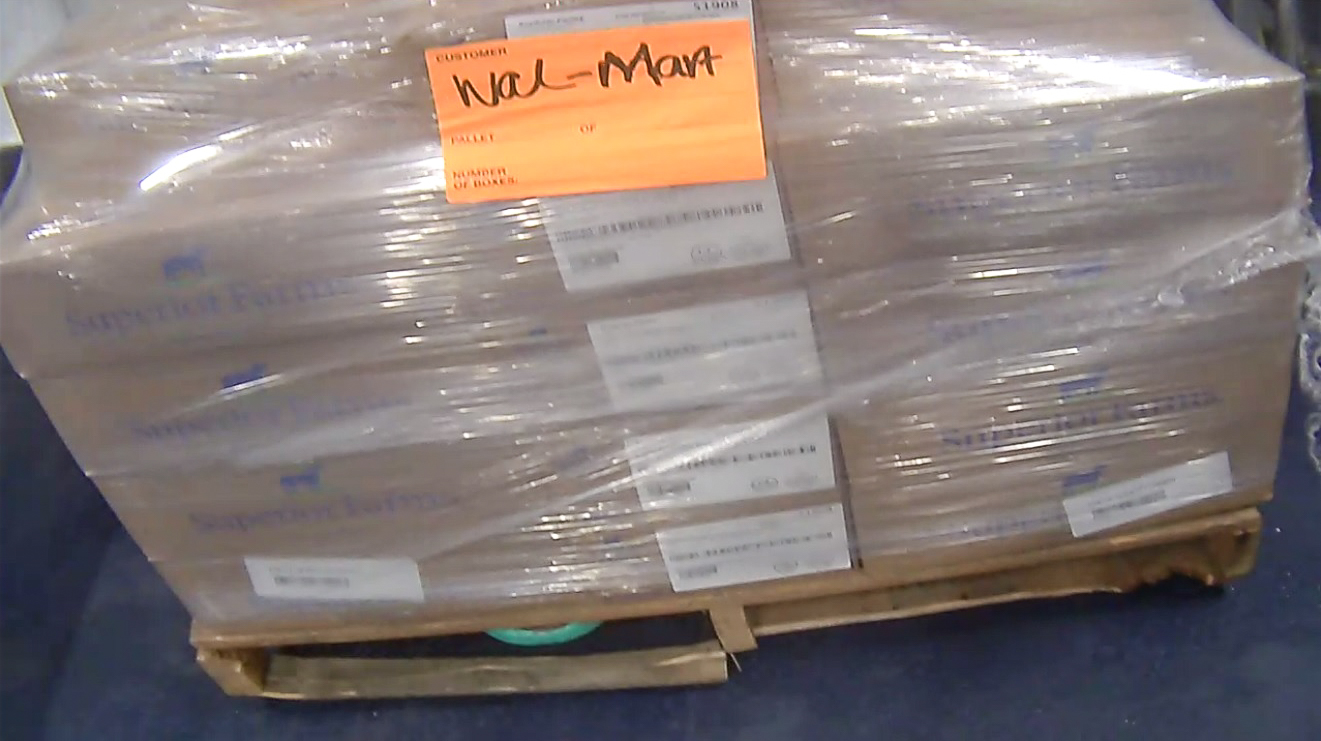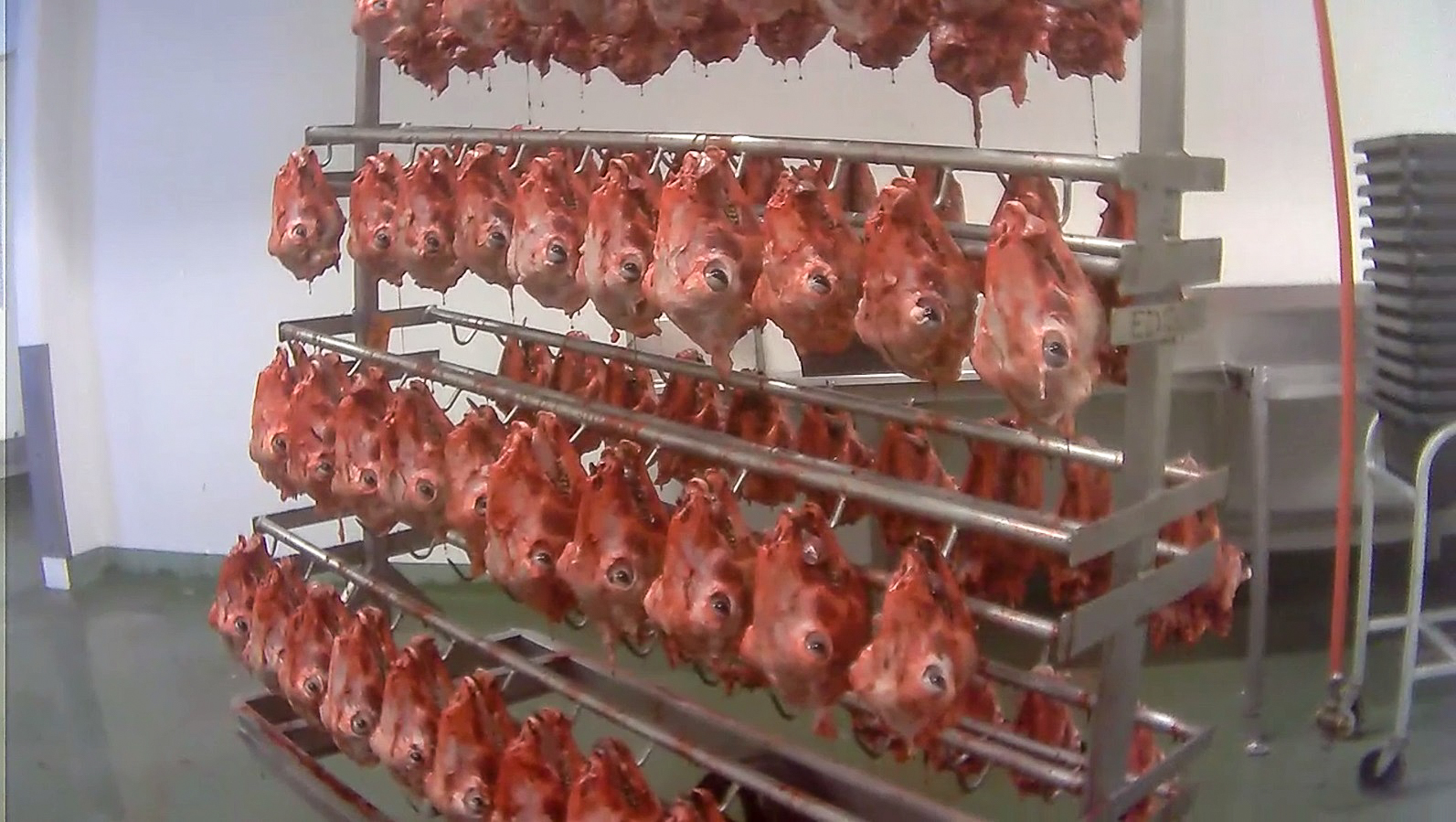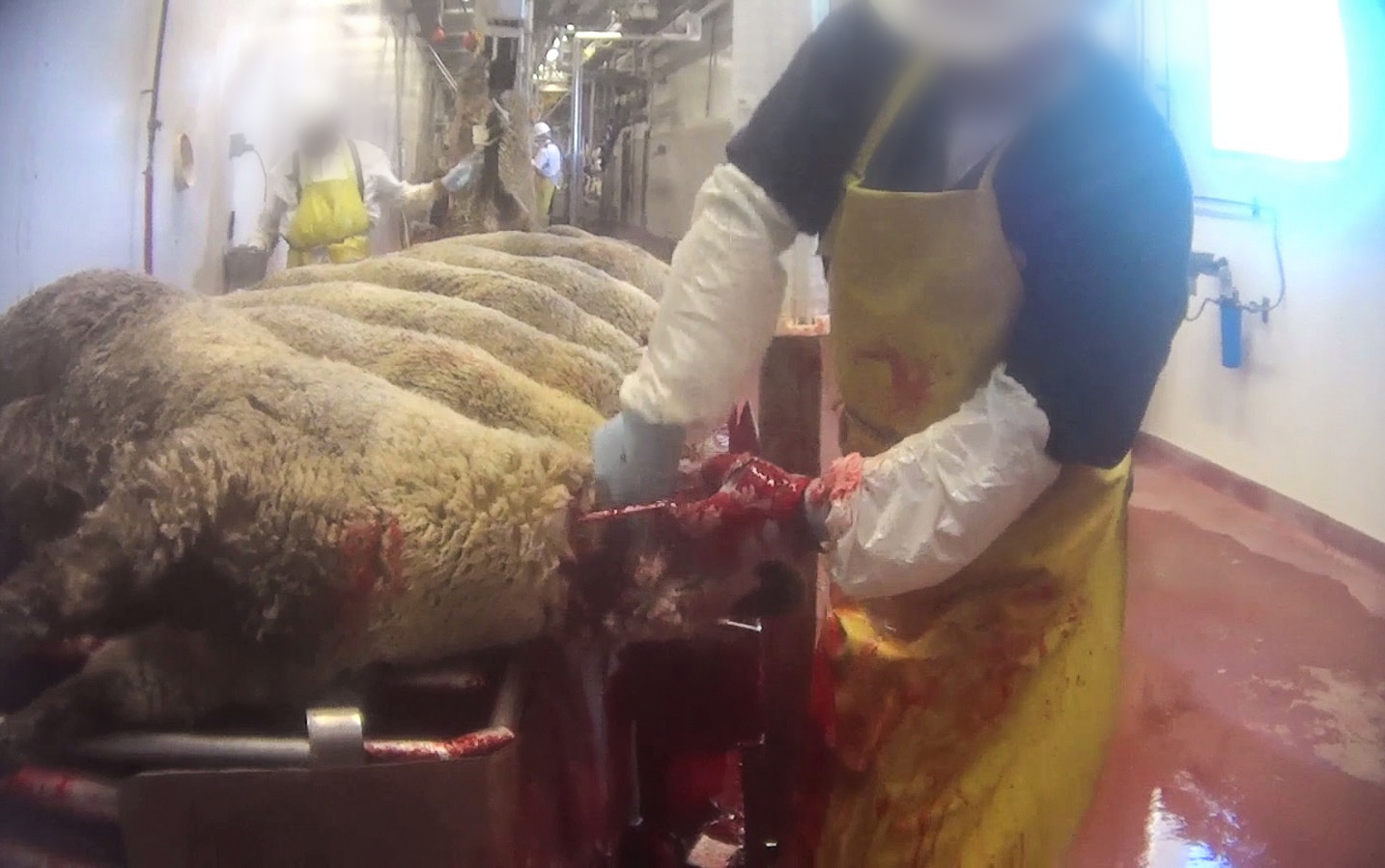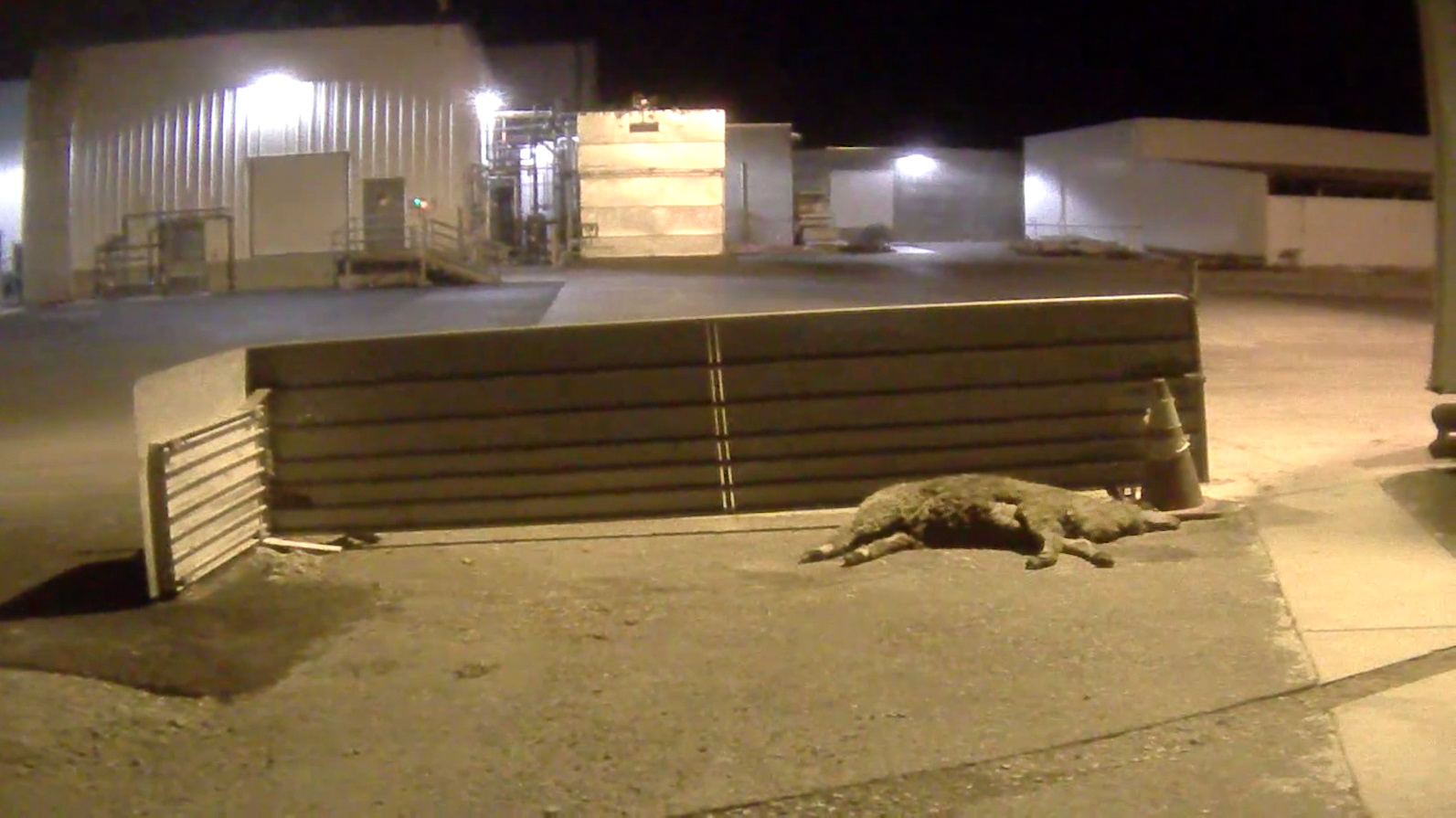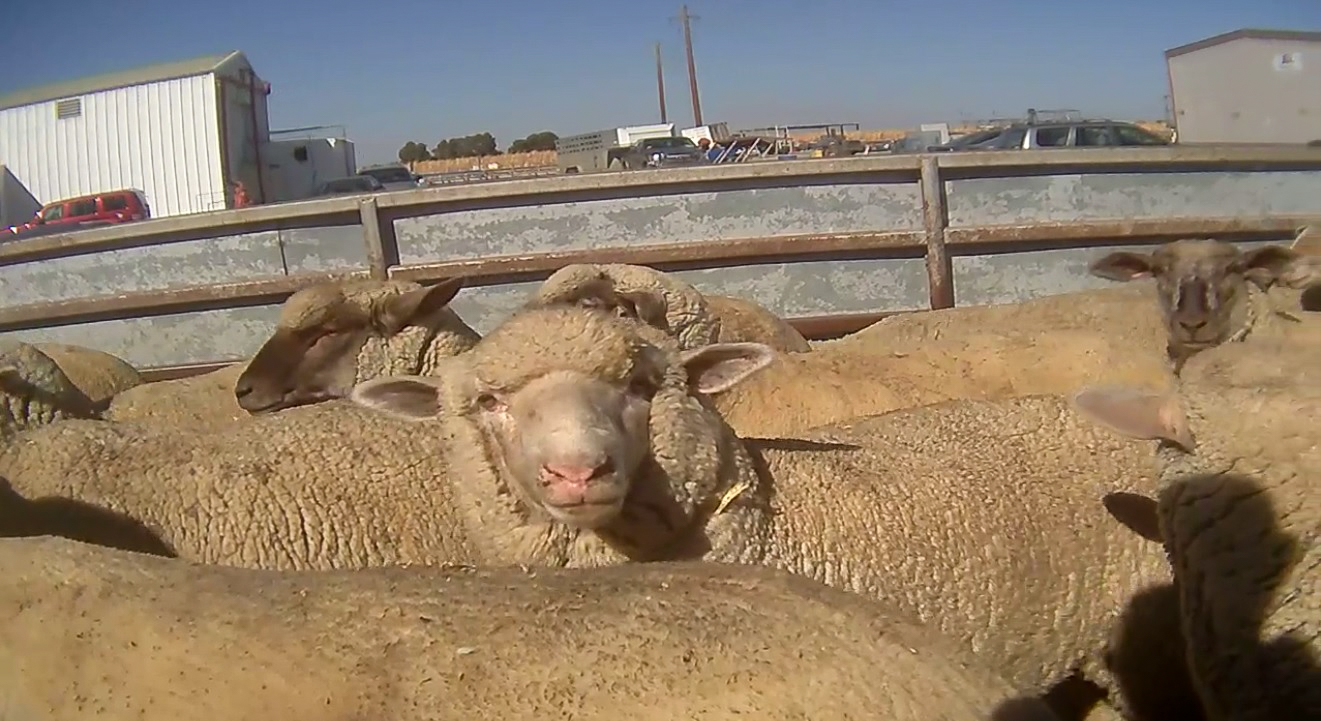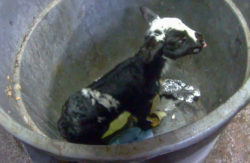- Like
- Digg
- Tumblr
- VKontakte
- Buffer
- Love This
- Odnoklassniki
- Meneame
- Blogger
- Amazon
- Yahoo Mail
- Gmail
- AOL
- Newsvine
- HackerNews
- Evernote
- MySpace
- Mail.ru
- Viadeo
- Line
- Comments
- SMS
- Viber
- Telegram
- Subscribe
- Facebook Messenger
- Kakao
- LiveJournal
- Yammer
- Edgar
- Fintel
- Mix
- Instapaper
- Copy Link
Horror at Superior Farms – Lamb Slaughter Exposed
Filmed by an Animal Outlook undercover investigator working for Superior Farms in Dixon, California, the graphic video captures the violent and bloody death that these young, gentle animals are forced to endure.
While Superior Farms touts its meat as “humanely harvested,” and uses a Halal certification seal on some of its products, Our undercover video reveals:
- Multiple violations of the federal Humane Methods of Slaughter Act
- Ineffective stunning, leading to some animals experiencing the shock of the electric stunner more than once
- Even after having their throats cut, many lambs are kicking or thrashing their heads – signs they can still feel pain – as their tails are cut off
The shocking footage also shows lambs being repeatedly jabbed with an electric prod, a herding dog biting these frightened animals to force them to move, workers grabbing and pulling lambs by their wool, and a very small young lamb confined in a garbage can.
2024 Update
Denver Slaughterhouse Ban Initiative 309 Gives Voters an Opportunity to Shut Down Superior Farms' Largest Lamb Slaughterhouse
If Denver voters approve initiative 309, Superior Farms' animal cruelty violations could finally be brought to an end.
See below for a statement from Pro-Animal Future:
Animal Outlook's 2017 investigation revealing rampant animal cruelty at lamb slaughterhouses owned by Superior Farms helped inspire a ballot initiative to ban industrial slaughterhouses in Denver, Colorado, home to the company's largest factory.
Now Denver voters are faced with a historic choice. Voting Yes on Initiative 309 will finally bring true accountability to a company that has recklessly violated animal welfare, labor, and environmental laws for years.
The problems at Superior Farms go beyond just the treatment of animals. The company's long history of environmental violations is well-documented, and it poses a risk not only to the animals but also to the local community. Residents of Denver have voiced concerns about pollution, noise, and odor issues stemming from the slaughterhouse, which sits in close proximity to residential neighborhoods. This pollution has the potential to affect air and water quality, endangering both public health and Denver's natural environment. Advocates were vindicated in September when the EPA announced a $120,000 fine levied against Superior Farms for violations of the Clean Air Act. The EPA's website also documents extensive, years-long violations of the Clean Water Act.
Superior Farms’ poor record of compliance with labor laws is yet another issue. Workers at the facility are subjected to dangerous working conditions, low wages, and a lack of benefits. Industrial slaughterhouses are notorious for their high rates of worker injuries due to fast line speeds, exposure to harmful chemicals, and the physical demands of the job. Despite this, companies like Superior Farms continue to prioritize profits over the safety and well-being of their workers, exploiting a largely immigrant workforce that has few other employment options. The company's plant in Denver has been fined $92,000 over the last decade for labor violations, but given their $250 Million annual revenue, these represent a slap on the wrist rather than true accountability.
A Yes vote on Initiative 309 sends a clear message: the public will not stand by while companies like Superior Farms cut corners at the expense of animals, workers, and the environment. The initiative seeks to ban all industrial slaughterhouses, not just Superior Farms, meaning it will have a lasting impact on how animals are treated in the city. It’s part of a broader movement to reimagine food systems that are kinder, cleaner, and more just.
Additionally, the ballot measure addresses an important environmental justice issue. Industrial slaughterhouses like Superior Farms are disproportionately located in lower-income areas and communities of color, who often bear the brunt of the negative environmental impacts. Superior Farms' Denver plant is located in Globeville, a majority latino neighborhood located in America's most polluted residential zip code. By banning these facilities, Denver can take a step towards rectifying these historical inequities and improving the quality of life for all residents, particularly those living in vulnerable communities.
Voting Yes on Initiative 309 is about building a future that aligns with Denver’s values of sustainability, fairness, and compassion. It’s an opportunity to set an example for cities across the country and to show that it’s possible to stand up to corporate interests that prioritize profit over people and the planet. Denver has a chance to make history, and the outcome of this vote could spark a nationwide movement to rethink the role of industrial slaughterhouses in our communities.
The choice is clear: Denver can either continue to allow companies like Superior Farms to operate without consequence, or it can take decisive action to protect animals, workers, and the environment. Voting Yes on Initiative 309 will lead to a cleaner, safer, and more just Denver for generations to come.
2019 Update
Historic Settlement after Animal Outlook Files Federal False Claims Act Lawsuit; Slaughterer Pays and Enters Consent Decree with USDA to Reform Practices
We teamed up with Public Justice to file a lawsuit under the False Claims Act as a whistleblower following our hidden camera investigation; in a rare move, the Department of Justice intervened over humane handling allegations.
After we determined what our investigator caught on hidden camera was horrific cruelty to lambs at Superior Farms, the largest lamb slaughterhouse in the U.S., we not only exposed these abuses for the world to see in a powerful exclusive report in The New York Times, we also took legal action to seek justice and demand change.
Our 2017 investigation inside Superior Farms is the first - and only - look inside a U.S. lamb slaughter facility, and our investigator documented what we believe were a variety of humane handling violations, despite the company’s claim to be using slaughter practices in keeping with federal and religious law.
At the time of our investigation, Superior Farms had been awarded numerous contracts from the USDA and Department of Defense to supply both fresh and frozen meat to the federal government for its food assistance programs, including the National School Lunch Program. As part of these federal contracts, companies are required to comply with the Humane Methods of Slaughter Act.
The False Claims Act (FCA) allows whistleblowers to file complaints when there is possible fraud against the government, including evidence alleging violations of government contracts. FCA cases are filed with the Dept. of Justice, which has the option to intervene and get more directly involved in the case.
Our False Claims Act case is the first-ever intervention and settlement by the U.S. Department of Justice over humane handling allegations at a ritual slaughter establishment. As a part of this settlement, Superior Farms' parent company, Transhumance, has entered into a consent decree with the USDA involving oversight and reform of several of its practices.
Our undercover video showed:
- Violations of the Humane Methods of Slaughter Act, which requires that animals a) be rendered insensible to pain before slaughtered, or b) be slaughtered in accordance with religious ritual that prevents the animal from feeling pain during the remainder of the slaughter process (such as kosher or halal methods)
- A policy of changing the “best by” date on fresh meat to make it appear fresher than it is. At times the dates were changed by more than two weeks
- A repeated failure to comply with its internal policy to run meat through metal detectors to ensure the meat is safe for consumption
The consent decree with the USDA mandates that Superior Farms:
- Within 30 days, must designate a Humane Handling Coordinator with at least two years of experience in livestock slaughter or who has taken instructional courses and training in humane handling and slaughter from a reputable organization. The humane handling coordinator will ensure compliance with humane slaughter law and equipment used to restrain and stun animals have been tested for functionality and that animals are rendered unconscious by a single application
- Conduct refresher training for its management, supervisors, and employees working in the live animal areas in all aspects of the humane handling and slaughter requirements set forth in the HMSA within 60 days
- To the extent that it continues to market itself as Halal, Superior Farms must maintain active certification for Halal slaughter from an outside Halal certifying organization
This case represents a milestone for animal advocates, where a public advocacy organization teamed up with the federal government to set a standard for oversight and enforcement and to promote reform.
We pursued this case with the vision that this resolution delivers: Real change for the animals at Superior Farms and a message to animal agribusinesses that compliance with humane slaughter law is not optional -- they are not free to police themselves, including at ritual slaughter establishments.
"This settlement sends a loud and clear message to industrial animal ag that consumer rights and animal welfare groups alike will hold it to account when it makes false claims, including leveraging the government where necessary,” said David Muraskin, Senior Food Project Attorney at Public Justice, who represents the whistleblower.
Animal Outlook was represented by Cheryl Leahy as well as Richard Elias of Elias LLC, David Muraskin and Brian Hardingham of Public Justice, and Jennifer Verkamp of Morgan Verkamp.
Kelli L. Taylor of the U.S. Department of Justice was among the government attorneys intervening in the case.
“After reviewing this video several times, in my professional opinion, there were several violations of The Humane Methods of Slaughter Act.”
Dr. Lester Castro Friedlander
former USDA Chief Veterinary Meat inspector
Superior Farms Investigation Photos
Superior Farms Investigation
Fresh? “Best By” Date Labels Changed
Our investigator also documented several other practices concerning finished food products, including Superior Farms violating its own metal detection policy by not sending all packaged meats through the detector.
Even more concerning, on more than a dozen occasions workers were documented changing “best by” dates on refrigerated meat labels, deceiving consumers about the freshness of those products as much as 15 days.
Their Skin and Wool are Turned into Boots; Other Body Parts Become Dog Treats
After these lambs are slaughtered, their skin and fluffy wool are ripped off to be sold to companies that turn them into car seat covers and designer boots like UGGs.
Other parts of these baby animals - their tails, ears, tracheas and lungs - are sold as dog treats.
Visit our Act Now page for cruelty-free alternatives to wool and lambskin.
About Superior Farms
Superior Farms is the largest producer of lamb in the U.S. Headquartered in Davis, California, the company’s Dixon, CA facility, where our investigator worked, is the largest lamb slaughter facility in the nation, killing up to 1,400 lambs a day.
Though the company says it “has a long-standing commitment to the well-being and care of the flock,” and touts its products “humanely harvested,” our heartbreaking video tells a starkly different story.
Superior Farms supplies the nation’s top two food retailers, Walmart and Kroger, as well as Amazon, Cabela’s, QVC and Sysco. The company sells lamb meat under the brand names Superior Farms, Farmer’s Mark, Cascade Creek and Sabor a Rancho.
As an organization dedicated to building a kinder and more just world for all, Animal Outlook stands in strong opposition to any form of discrimination or oppression.
Over the past 20 years, Animal Outlook has become well known for its effective investigations to expose the vast animal suffering kept hidden behind the closed doors of animal agribusiness.
Every time our investigators work inside a slaughterhouse or factory farm, we’re never exactly sure what our cameras will capture behind closed doors — as was true of Superior Farms, the largest lamb producer in the U.S.
Our investigation is the first time a U.S. lamb slaughterhouse has been exposed, and our video provides a shocking look at what gentle lambs killed for their meat are forced to endure. And while we did expect to see violence and cruelty, as is standard practice in the meat industry, we didn’t know until after our investigation began that Superior Farms is slaughtering animals under a Halal certification.
While Superior Farms does not appear market all of its products as Halal, all lambs inside the facility where our investigator worked are slaughtered under what are supposed to be Halal rituals. However, our footage reveals consistent and systematic violations of Halal law and principles.
After reviewing our video, Mohamed Ghilan, Ph.D., a vegan and student of Islamic traditions, told us: “As a practicing Muslim I find the cruel treatment I watched in those clips to be contrary to what the Quran and the Prophet Muhammad taught on animal welfare. Muslims usually assume that a Halal certified animal product means the animal was not mistreated. Discovering this not to be the case will horrify most of our community.”
Kristen Stilt, JD, Ph.D., Director of the Islamic Legal Studies Program and the Faculty Director of the Animal Law and Policy Program at Harvard Law School, said:
“Minimizing suffering of the animal is an overarching consideration in Halal slaughter.The methods used in the video shown to me directly conflict with the principles of Halal slaughter. I have seen many examples of Halal slaughter that do not actually meet the expectations and requirements of Halal, but I have never seen an example in which the wrongful acts are perpetrated with the degree of intentionality and uniformity as seen here. The employees are intentionally and systematically inflicting additional and unnecessary pain with additional cuts to the throat and the tail cutting. This is not a case of a few mistakes or missteps in the slaughter process. Rather, the entire process used in this slaughterhouse is fundamentally inconsistent with the concerns of halal slaughter. The practices also violate the Humane Methods of Slaughter Act.”
We recognize some may seek to use our video in a negative manner to further rhetoric intended to be hurtful to practicing Muslims. As an organization committed to standing against all forms of oppression, we are deeply saddened by the possibility of this misguided response.
We strongly encourage everyone who watches our video to challenge the violence and cruelty found in all slaughterhouses. Every time our investigators go inside animal agribusiness operations, we uncover horrific abuses. Sadly, farmed animals are routinely treated like unfeeling meat-, milk- and egg-producing machines and are forced to endure tremendous suffering. As long as facilities like Superior Farms are driven by profit, animals will continue to pay the price.
Animal agribusiness is determined to keep consumers in the dark, not only by hiding behind closed doors but by desperately trying to pass laws criminalizing the mere exposure of the truth.
From the beginning of his time working at Superior Farms, our investigator could sense the fear these young animals faced. We believe compassionate people of all faiths will be appalled by the egregious abuse we documented there.
The best way we can help lambs, pigs, chickens, cows and all animals is simply to leave them out of our shopping carts and out of our wardrobe. We promote vegan eating as a way to build a kinder world for all.
“I find too many instances of animals who appear to still feel pain sensations after stunning and throat-cutting.”
Dr. Holly Cheever
Cornell Veterinary School graduate
Press
- How Undercover Investigation of Lamb Slaughterhouse Led to Federal Prosecution Sentient Media on June 14, 2019
- Animal Rights Group Says Video Shows Abuse of Sheep The New York Times on Feb. 2, 2017
- First-Ever Exposé Inside a US Lamb Slaughterhouse IndyBay on Feb. 3, 2017
- The UGGly Truth About What Happens Inside a Sheep Slaughterhouse Exposed in New Undercover Video World Animal News on Feb. 3, 2017
- First Lamb Slaughterhouse Investigation Exposes Cruelty VegNews on Feb. 6, 2017
Act Now
Horror at Superior Farms: Speak Up for Lambs
Animal Outlook’s courageous investigators work undercover to shine a bright light on the suffering of farm animals kept hidden behind the closed doors of animal agribusiness.
Sadly, the gentle lambs documented at Superior Farms are not the only ones suffering and dying in this cruel industry. Although lamb consumption is drastically lower in the U.S. today than it was 50 years ago, approximately two million of these gentle animals are slaughtered annually nationwide. And as with most animals farmed for meat, lambs (or young and baby sheep) account for the majority of those killed.
Thankfully, there are simple steps YOU - and each one of us - can take to make a difference for lambs and all farmed animals.


